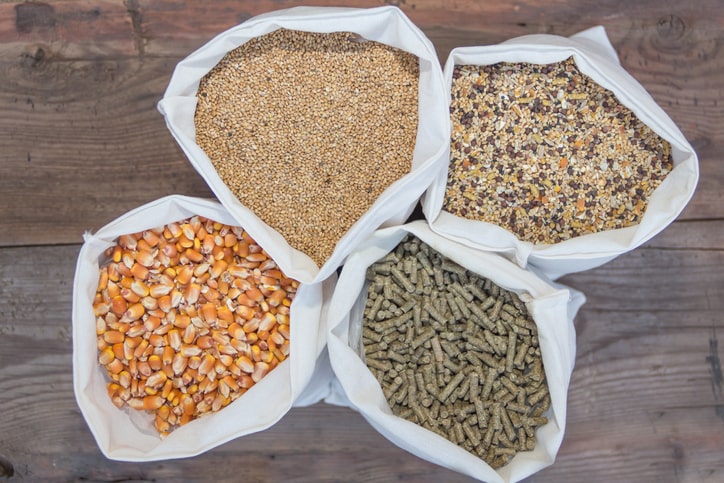Why are bees in my chicken feed? This is a question many poultry enthusiasts have been asking. Its both puzzling and concerning to find bees swarming around your chicken’s feed. To understand this phenomenon, we need to dive into the reasons behind it.

The Relationship Between Bees and Chicken Feed
Bees are known for their role in pollination, but what connection do they have with chicken feed? Here, we explore various factors that attract bees to chicken feed.
Understanding the Attraction
Bees are primarily attracted to foods rich in protein and carbohydrates. Chicken feed often contains corn, grains, and other ingredients, which can be a source of these nutrients.
The Role of Sweetness
Bees are particularly drawn to sweet substances. Certain types of chicken feed may have molasses or other sweeteners, enticing the bees.

Potential Risks to Your Chickens
Having bees around your chicken feed is more than just a nuisance. It poses several risks to your poultry.
Risk of Stings
One of the immediate concerns is the risk of bee stings. Chickens pecking at their feed may inadvertently provoke bees, leading to stings which can be harmful to them.
Contamination Issues
Bees can carry bacteria and other pathogens that may contaminate the chicken feed, posing health risks to your flock.

Ways to Prevent Bees in Your Chicken Feed
Fortunately, there are several strategies you can employ to keep bees away from your chicken feed.
Using Bee-Proof Feeders
Investing in feeders that are designed to be bee-proof can help mitigate this issue. These feeders usually have small openings that allow chickens to feed while keeping bees out.
Keeping the Area Clean
Maintaining cleanliness around the feeding area can reduce the attraction for bees. Ensure to clean up any spilled feed immediately.
Choosing the Right Feed
Selecting feed without sweeteners can lessen the likelihood of attracting bees. Opt for feeds with minimal sugary content.

Natural and Chemical Repellents
If youre still having issues, consider using repellents to keep bees at bay.
Natural Repellents
Essential oils like peppermint and eucalyptus are effective in repelling bees. Spraying a diluted mixture of these oils around the feeding area can help.
Chemical Repellents
There are also commercial chemical repellents designed to keep bees away. Be sure to choose a product that is safe for poultry and does not contaminate the feed.
Integration of Beekeeping and Poultry Farming
Interestingly, some farmers have successfully integrated beekeeping and poultry farming. This requires strategic planning to ensure harmony between the bees and chickens.
Creating Separate Zones
Establishing distinct zones for bees and chickens can help in managing both effectively. Use fencing or natural barriers to keep the areas separate.
Benefits of Dual Farming
When managed well, dual farming can be beneficial. Bees assist in pollinating crops, while chickens help in pest control. This symbiotic relationship can lead to a more sustainable farming practice.
Case Studies and Real-Life Examples
Lets look at some real-life examples where poultry farmers have dealt with the issue of bees in chicken feed.
Case Study 1: The Smith Family Farm
The Smith Family Farm in Texas faced a challenging situation with bees invading their chicken feed. By implementing bee-proof feeders and switching to less sweet feed, they managed to control the problem effectively.
Case Study 2: Green Meadows Poultry
Green Meadows Poultry decided to embrace the presence of bees. They integrated beekeeping into their farming practice, creating designated zones for bees and chickens. The farm now thrives with the dual benefits of pollination and pest control.
Expert Opinions
What do experts say about bees in chicken feed? Here are some insights from poultry and beekeeping experts.
Dr. Jane Thompson
Dr. Thompson, a renowned poultry expert, advises farmers to monitor the nutrient content of their chicken feed. She emphasizes the need for cleanliness to avoid attracting bees.
Mr. Alan Whitfield
Mr. Whitfield, a professional beekeeper, suggests that farmers can use natural repellents as a first line of defense. He also advocates for awareness about the coexistence of bees and chickens.
Long-Term Solutions for Managing Bees
Addressing the immediate issue is essential, but its equally important to focus on long-term solutions.
Regular Maintenance
Regularly check and maintain your feeding equipment. Replace damaged feeders that may allow bees to access the feed.
Continuous Learning
Stay updated with the latest research and practices in poultry farming and beekeeping. Continuous learning can help you adapt to new challenges effectively.
Future Trends in Poultry and Beekeeping
The future trends in poultry farming and beekeeping are evolving. Innovations in feed technology and farm management practices are on the rise.
Technology Integration
Future trends might see better integration of technology in farming practices. Smart feeders and automated systems can help manage the issue of bees in chicken feed more efficiently. Learn more about these trends here.
Sustainability Practices
Emphasis on sustainability in farming is increasing. Integrating environmentally friendly practices can lead to more harmonious and productive farming. Learn more about sustainable practices here.
FAQs
Why are bees attracted to chicken feed?
Bees are attracted to the protein and carbohydrates in chicken feed, and sometimes the sweeteners added to it.
How can I prevent bees from accessing my chicken feed?
Using bee-proof feeders, keeping the feeding area clean, and removing sweeteners from the feed can help.
Are there any benefits to having bees and chickens on the same farm?
Yes, if managed well, bees and chickens can coexist beneficially. Bees aid in pollination, and chickens help in pest control, creating a sustainable farming environment.
For more insights and tips on poultry farming, visit this link and this page!
As an Amazon Associate, I earn from qualifying purchases.
As an Amazon Associate, I earn from qualifying purchases.









